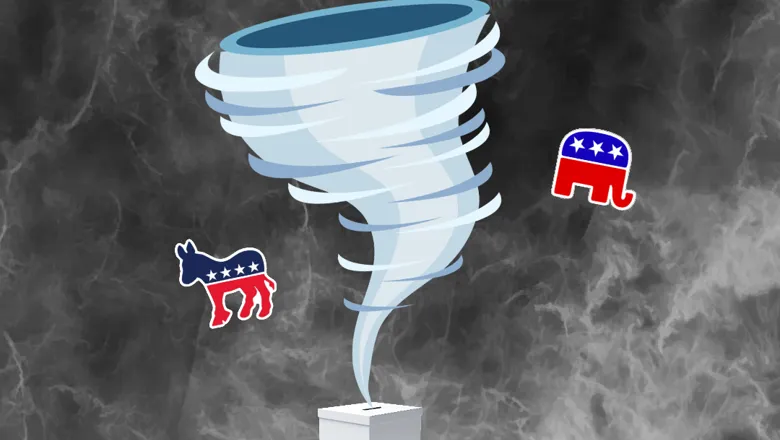07 January 2025
Does exposure to natural disasters change the way people vote?
Exposure to natural disasters has a significant effect on the political choices of the public in the United States as voters become driven by material self-interest, a new study has found.

Those living in close proximity to the path of a hurricane were much more likely to vote for a Republican candidate than a Democrat, with an electoral penalty for the latter of between 5-15 percentage points.
As the party traditionally associated with cutting support for publicly-funded insurance, and therefore protection against natural disasters, the result appeared to be counter-intuitive.
However, in her study, Dr Raluca Pahontu, from King’s College London, also found that the closer people lived to the path of a hurricane the more likely they were to make enquiries about, and thereafter purchase, private asset insurance.
As a result of the protection provided by the insurance, Dr Pahontu’s research suggests those people became more tolerant of risk and were therefore more likely to turn to the political party traditionally associated with cutting taxes and, as a result, their personal expense; the Republicans.
Dr Pahontu said: “I explored several drivers likely to account for the increase in Republican vote share in areas spared from destruction: religiosity, authoritarian values, law and order, learning, and cognitive dissonance. Empirical evidence failed to support any of these possible accounts of changing vote choice.
“Instead, I propose an alternate theory in which changing Democrat support is driven by changes in risk aversion. I found support for a two-step process linking hurricane proximity and risk aversion.
“Firstly, a near-miss increases risk aversion behaviour by updating beliefs about the riskiness of the environment, prompting insurance uptake. The subsequent purchase of insurance then reduces risk aversion.
“I rely on individuals’ intensity of insurance inquiries to confirm that insurance, in particular asset insurance, peaks in months when hurricanes nearly hit them, as well as on panel data on actual insurance purchases, and on panel data on risk aversion to substantiate the claim that individuals choose a riskier gamble following a near miss.
“Together, these results provide convincing evidence of the likelihood of the theory.”
Data for the study was drawn from results for all Senate and House of Representatives elections held between 2002-2014 as well as data for hurricane tracks in the US between 1851-2014 from the National Hurricane Centre.
Dr Pahontu also utilised data from insurance inquiries made via Google and purchases made from the National Flood Insurance Programme.
For US Senate elections, results show that proximity to hurricane path of winds of at least 64 knots decreases the Democrat vote share. The strongest effect was visible among those closest to the hurricane path, in particular those within 100 km. Within these precincts, the Democrat vote share was reduced by 2.5 percentage points. The magnitude of this effect increases four times in size to about 11.5 percentage points when looking only at proximity to major hurricanes.
For the House of Representatives, the results show an increase in Republican vote share by seven percentage points for those between 30 and 50 km from the hurricane path. Proximity to major hurricanes decrease the Democrat vote share by more than 13 percentage points.
Read the full report...
The full paper, published in the Journal of Politics, can be read in full here.

